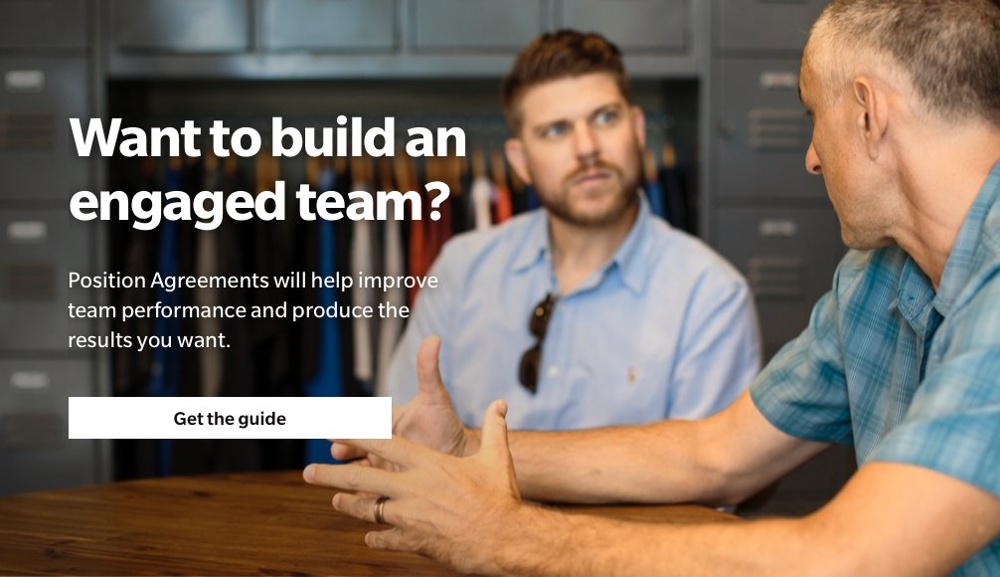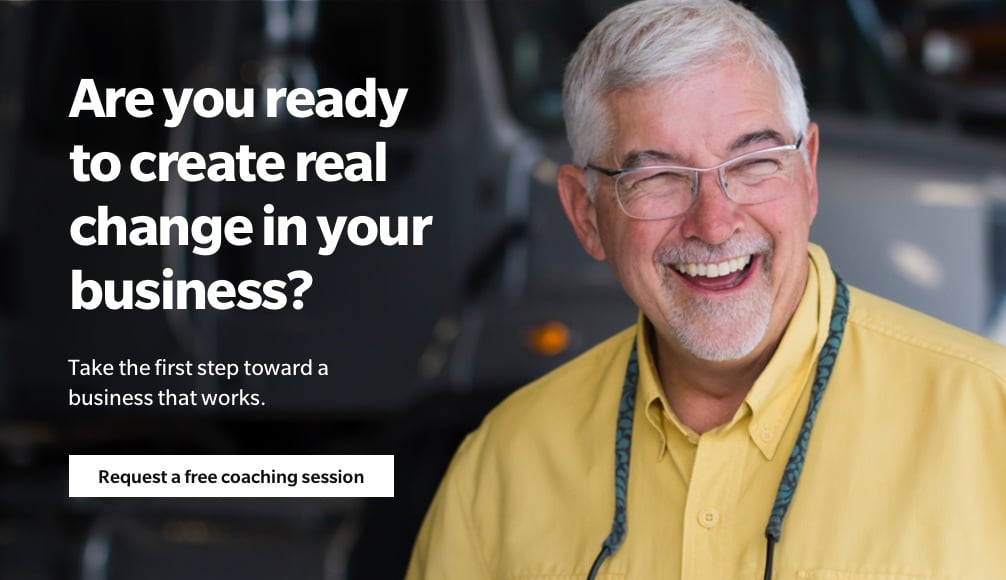Joe Dibbits grew up watching his steadfast father carry every role and responsibility in the excavating business he’d started with a leap of faith. “My father started with a used machine that broke down so many times,” Joe says. “He knew he either needed to buy a new machine and continue on with the business or just quit.” So Joe’s parents took out a loan greater than the value of their home—and 50 years later, Dibbits Excavating and Landscape Supply is thriving, with Joe at the helm.
Joe never set out to take over. After high school, he left home to pursue wildlife fishery work. But when his parents offered him a job in 1993, Joe and his wife felt like it was the right choice for their future. Climbing the ranks of the company from truck operator to machine operator and then site manager, Joe officially took over ownership in 2013—and slid right into his dad’s position of overwhelmed Technician.
As the company grew to meet demand, so did the demand on Joe’s time. As the company diversified, he knew he couldn’t maintain the level of effort needed to manage it wisely for much longer. So he sought out advice—and found it in his EMyth Coach, Eric Coet.
At the beginning of July, we spoke to Joe and his Coach Eric to discuss how Joe made the incredible transition from a Technician who was constantly on call, to an Entrepreneur whose phone barely rings.
EMyth: We know that your company, Dibbits Excavating and Landscape Supply, is based in Ontario, Canada, and offers excavating service and landscaping supplies and retail. Can you tell us a bit more about your business?
Joe Dibbits: My father stepped out on his own in 1970 to start his own business with only a used tractor backhoe. There were certainly challenges at first, but with the support of my mother, he laid the foundations for our company, which has always been built with the utmost integrity, to offer exceptional service and a quality product to our greater community. Now we’re in our 50th year. We currently have two divisions: excavation services—which is our long-term, heritage service—and landscape retail supply. We added the landscape supply six years ago and at this point it’s about 60% of our revenue.
EMyth: At what point did you take over leadership of the family business?
Joe: Growing up, I never really had a great interest in construction truthfully. I left home for college for fishery work, but came back and took a job in the company in 1993. In 2010, my parents approached me to consider a succession plan, and in 2013, I became the sole owner of the company.
[People] really need to be viewed as an investment. I truly realize that now—a hundredfold over—as we hire the right people.
Joe Dibbits, Owner, Dibbits Excavating and Landscape Supply
EMyth: What challenges led you to seek business coaching?
Joe: Ours is a heritage company built on strong values with excellent growth. When I took over the day-to-day operations of the company, it was a natural fit for me. But as the company continued to grow, the demands of my time increased more and more. Coming from the fisheries background of collecting precise data, and also having the hard-work ethic of my parents, made me an excellent Technician. But I realized that as the demands grew with the company, I wasn't going to be able to maintain the level of effort required to manage it wisely. I felt that good business management training would help.
EMyth: What's changed in your business since you started working with Eric?
Joe: One of the largest changes is a real emphasis on systemization. I looked at all the foundations of my personal Values, Passions and Purpose, and then moved into the company values, laid out the [company’s] organizational structure and the employee Position Agreements related to that. Eric's involvement in initiating that process was really instrumental.
EMyth: Eric mentioned that developing the people side of your business was a huge game-changer for you. Can you tell me a little more what that work was like?
Joe: When we started fleshing out an organizational chart and the related Position Agreements, I quickly realized the importance of getting the right people in the right positions. Before that, I hadn’t recognized the value of having those right people where they are. One thing that my EMyth Coach Eric really reinforced in my mind was that staff and new hires are not an expense to be viewed as an expense. They really need to be viewed as an investment. I truly realize that now—a hundredfold over—as we hire the right people. We’ve got exceptional people, and as I transfer more of my roles and responsibilities to them, it makes my job easier. It gives me more time—as EMyth talks about—to work on the business instead of in it. It was a big transition for me to see the value of that.
EMyth: Did that perspective shift—viewing employees as an investment versus an expense—change your hiring process?
Joe: Definitely. As the company grew, we were mostly hiring operator and labor-type positions. Now we're looking for different skill sets, including more managerial skills. The people we've hired have been exceptional. They offer a lot of valuable insight into the culture we have here, and they love what they do. It's exciting to work with people like that. And I appreciate how much they share ideas for the future of our company and provide ways of attaining those goals and visions.
EMyth: Eric, can you talk about what Joe’s process of shifting out of Technician mode was like from a coaching perspective?
Eric Coet: Joe had his hands in every aspect of the business, but a lot of his time was spent managing field operations and experiencing the overwhelm that goes along with that. And early on, he was uncomfortable with the notion of replacing himself in certain roles. So when we first went through the organizational strategy work and he laid out an organizational structure that met his future vision for the company, he had to ask, “What would this structure have to look like in order to grow into this vision?” and, “How am I going to have to step back as a Technician?” That was a real give and take.
Joe wondered if he could really find the right people that could manage his business the way he did, and to his expectations. There's a bit of anxiety with any business owner that scales their business beyond themselves. Joe and I have been working together, and having this discussion, for four years now. This is a transition—it doesn't have to happen overnight.
We revisited the organizational strategy and Position Agreements many times to make sure he had a good design that he was comfortable with. And when he felt it was the right time to make the transition, he started hiring for several key roles.
Joe: It’s hard to imagine, but I had to hire three individuals to take over a lot of my responsibilities. The value of that is incredible. One of the toughest things for me to realize was that allowing others to take on my former responsibilities would bring us greater business opportunities. It took me a while to get used to that. Even today, I still struggle with that a little bit. One of our key hires, our landscape operations manager, has really taken our landscape supply side to a whole different level. He’s younger and has invaluable insight into how to use the web, e-commerce and different software to help better manage the company. On the excavation side, hiring a product development manager to do all the estimating and permitting related to projects, and an excavation services operations manager to run the day-to-day was really freeing.
It's interesting—when you hire good quality people, they make it seem like your job wasn't that hard [laughs]. I was surprised by how quickly our long-term loyal customers switched over to working with these managers. My phone hardly rings anymore. And you think that that would be a beautiful thing, that you’d be elated, but a small part of me sort of misses being the center of the storm. So that’s a big transition, as strange as it sounds.
EMyth: It sounds like a big shift mentally to make that change in the business, but also personally, just to be able to step back from it. How have the long-time employees who've been with you for years adjusted to the changes? How did you bring them along?
Joe: We had a strategic planning session with the team last winter, and it was instrumental in raising the bar of involvement, especially some of these longer-term employees. They’d always known that their hard work and input were appreciated, but having a voice and being involved in company development meetings, being involved in the different [business development] modules where we look at transforming frustrations and solutions—that made them open to having other managers. There were a few rough spots along the way, but in the end, my team really appreciates the new people we have here. They’ve congratulated and supported me on my new role, and I think it's because they realize how much they're appreciated, that their voices and ideas are important.
Eric: I’d add that you've hired to your values. You've done the work to design the new roles, to design what your company really is, and you had the discipline to go out and seek those individuals that are good, cultural fits who share your same values. I was astounded by that, and in being face to face with them, I could see it in every person in that room.
Joe: We have an extensive long-term vision and a great brand promise, which is a reflection of the people that work for us, whether they’ve been with us for a month or for 20 years. It doesn’t matter what product they own, they always treat it like it’s their own. Throughout the process, they came up with values that were important to them, which align with our own: working with integrity, working with vibrancy, having fun in the work that we do and always striving for excellence.
It's interesting—when you hire good quality people, they make it seem like your job wasn't that hard.
Joe Dibbits, Owner, Dibbits Excavating and Landscape Supply
EMyth: What impact have the changes to your business had on your personal life?
Joe: Bringing the right people on has certainly created more freedom for me to work on the business, but even in my personal life, I have a lot more freedom. My phone used to ring 10-15 times a night. Now my phone never rings at night, and hardly during the day. The value to my family is big. I have four daughters who are still reasonably young, so I’m able to spend time with them. Not being interrupted by the business all day is a wonderful thing.
EMyth: What have been your biggest areas of development as a leader?
Joe: The biggest change for me was giving up the positions and responsibilities that I held. My father started the company on his own. He certainly took on all the roles and responsibilities of running it, and I followed in his steps, in his same method of operating. But realizing the value of great people has been very freeing.
Eric: One thing that's never changed in Joe is his willingness to be truthful about how he's standing in the way, about the issues that he sees in his organization, and about how uncomfortable he may feel to step out of his comfort zone to try new things like hiring somebody and delegating responsibility. But he has an unrelenting commitment to do the work. Since day one, even though he felt overwhelmed by the different roles, he’d always carve time out to work on the business and trust the process. So he's really working on himself—that's the one key aspect of how he's been able to successfully transform his business over the last four years to where it is today. But the biggest area of growth, I’d agree, has been Joe’s willingness to step back and to put his focus on developing and mentoring people, and accepting his role as CEO rather than being the Technician all the time.
EMyth: Speaking about that dedication to doing the work, Joe, how did you carve out the time to commit and focus?
Joe: I decided that I was only going to do [business coaching] if I could commit time to working through the material and to work with somebody like Eric. He’s a friend, a mentor, and his time is valuable too. So accountability was very important. Without accountability, I'm not sure we’d be at the point we are now.
EMyth: What were the challenges you faced coming into the family business and assuming the leadership role?
Joe: I'm a firstborn child, so one of the challenges was not wanting to disappoint my parents by not taking on the roles and responsibilities that they gave me. And as we moved further into succession, I started to question if I was capable of taking on the leadership role did I have the skills and the ability to lead others? That was a challenge early on.
EMyth: Eric, how do you work with coaching clients who’ve taken over the family business?
Eric: Well, it adds an extra level of sophistication and dysfunction, quite honestly, in a lot of cases. But one pillar we need to stand firm on is the need to run your business like a business, regardless of whether or not someone on the team is your brother or your brother-in-law or your son. And when you design a working business system with functional roles, there are healthy boundaries that need to be in place. Nobody should assume a role in an organization unless they actually fit that bill and fit into your organization.
So the same expectations need to be held whether that individual is a family member or not. I've seen really healthy examples of that, and I've seen very dysfunctional examples of that. In Joe's case, it's a healthy example. His father brought him in and made him work his way up through the business, and assume different roles from the bottom up. He had to earn the respect of his peers, as well as earn the responsibilities of becoming the future leader of the organization.
EMyth: Joe, now that Dibbits Excavating and Landscape Supply has hit its first 50 years, tell us about your vision for the future.
Joe: Really our vision is to honor the brand promise that we fleshed out together with our staff. Staying true to our promise of treating every project we do [for our clients] as if we were doing it for ourselves, and having fun working together—that would be our vision realized. Related to the growth of the company, we have many plans: to expand our landscape supply services into global e-commerce, to implement enterprise resource-planning software to manage both sides or the business, and to purchase quarries to source our own aggregates and eliminate needs from outside suppliers. And we're working towards lofty profit goals of 25% by 2022. We have a vision of contributing 25% of those profits to serve and bless our community. Lastly, we're in a geographic area where we feel there's a need for a second location, so it’s definitely something we’re considering.
EMyth: You mentioned that your revenue now is projected at $8.5 million this year. Can you tell me what it was four years ago?
Joe: In the last two years we’ve doubled our revenue and we expect that at the end of this season, we’ll see a 60% increase in overall revenue. So the revenue is increasing rapidly.
Eric: I’d just add to that when Joe was initially casting his first long-term vision, it was to get to $10 million a year in annual revenue. And I remember how uncomfortable, Joe, you were with that number—like, “How we could possibly get to that number?” And I think you're figuring out that that number may be a lot lower than your trajectory at this point. And that does not happen without investment. It doesn't happen without the investment that you've made in not only working on your business, but of hiring key people and scaling beyond yourself. So now, because of your investment of time and resources in recent years, you have the momentum to scale even further.
Joe: When you look at developing a long-term vision and put actual numbers on that vision, that can be a bit scary. An older gentleman in our community always said to me, “Joe, just make sure that as you grow, you grow in control, not out of control.” And I have complete confidence that we are growing in control and that we've pulled in the right people to make that possible. So I’ve gone from being overwhelmed in the day to day to being excited about what I do every day.





Comments